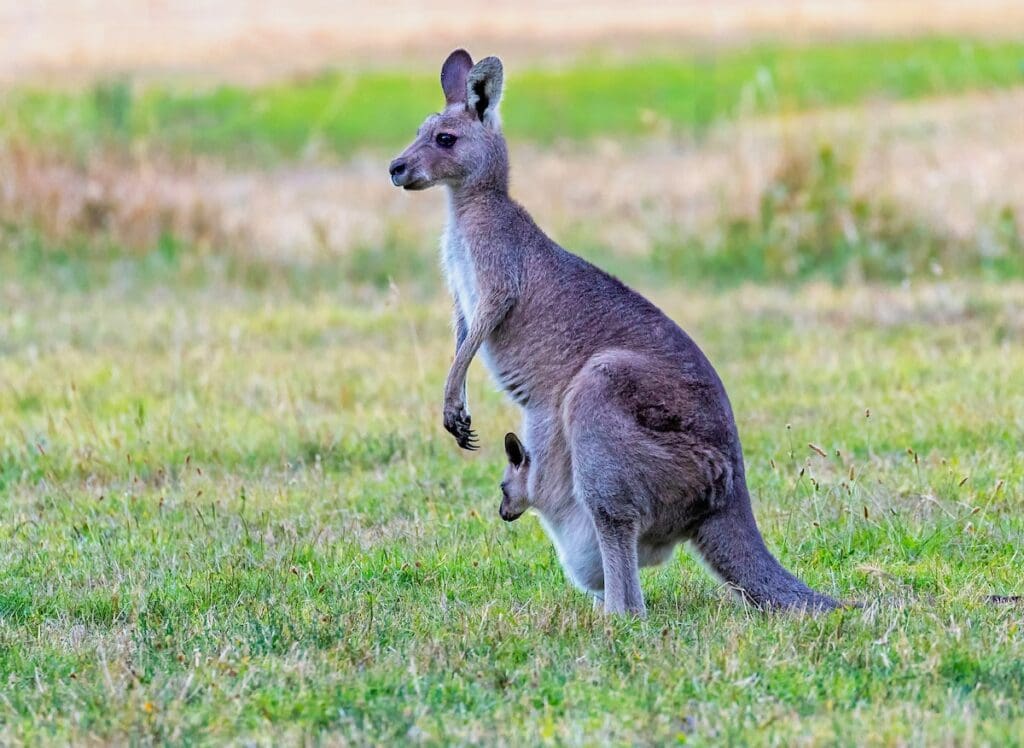Discover the Fascinating World of These Bouncing Marvels!

Kangaroos are extraordinary creatures that captivate the imagination with their unique adaptations and playful nature. As iconic symbols of Australia, these marsupials have captured the hearts of kids and families worldwide. In this article, we invite you to hop into the world of kangaroos and uncover 10 fascinating facts about these bouncy marvels. Get ready to be amazed by their incredible abilities and learn what makes them truly special.
Marvelous Marsupials:
Kangaroos belong to a group of animals called marsupials, which means they carry their young in a pouch. After a short gestation period, the tiny, underdeveloped joey crawls into the mother’s pouch where it continues to grow and develop for several months. This unique reproductive strategy allows the mother to protect and nurture her young in a safe environment.
Hopping Wonders:
One of the most distinctive features of kangaroos is their incredible hopping ability. Using their strong hind legs, kangaroos can leap up to 30 feet in a single bound and reach speeds of over 35 miles per hour. This efficient form of locomotion enables them to cover large distances quickly while conserving energy.
Size Matters:
Kangaroos come in various sizes, ranging from the tiny musky rat-kangaroo, which is about the size of a mouse, to the mighty red kangaroo, which can grow up to 6 feet tall. The size of a kangaroo species is often determined by its habitat and the availability of food.
Built for Leaping:
To facilitate their incredible jumps, kangaroos have specialized adaptations. Their long and muscular tails act as a balancing mechanism, providing stability during leaps. Additionally, their hind legs are built for power, while their short forelimbs help them maintain balance and assist in grooming.
Herbivorous Appetites:
Kangaroos are herbivores, which means their diet consists mainly of plants. They have a unique digestive system that allows them to extract maximum nutrition from fibrous vegetation. Kangaroos possess a chambered stomach where bacteria break down tough plant material, enabling them to thrive on a diet that would be indigestible to many other animals.
Social Structures:
Kangaroos are generally social animals and form groups known as mobs or troops. These groups can range in size from just a few individuals to over 100 kangaroos. Within the mob, there is a hierarchical structure with dominant males leading the group and females forming smaller family units.
Tail as a Third Leg:
Kangaroos have a strong and muscular tail that serves multiple purposes. Apart from aiding in balance, the tail acts as a third leg when the kangaroo is stationary, allowing them to sit upright and support their weight. It also acts as a powerful weapon for defense, with some species using their tails to deliver forceful kicks.
Communication through Boxing:
When disputes arise, kangaroos employ a unique method of communication known as boxing. Using their powerful hind legs, they deliver swift kicks to fend off rivals or establish dominance within the group. It is primarily a display of strength rather than an aggressive act, and it often involves impressive acrobatics.
Night Owls:
Kangaroos are primarily nocturnal or crepuscular, meaning they are most active during the night or twilight hours. This adaptation allows them to avoid the heat of the day and reduces their exposure to potential predators. However, some kangaroo species, such as the red kangaroo, may also be active during the day in cooler climates.
Cultural Significance:
Kangaroos hold great cultural significance in Australia. They are featured in Aboriginal Dreamtime stories, artwork, and traditional ceremonies. Additionally, kangaroos are a beloved symbol of the country, prominently featured on coins, sports team logos, and even as mascots for international events.
Kangaroos are truly remarkable creatures that captivate our imagination with their unique adaptations and playful behaviors. From their incredible hopping abilities to their herbivorous diets and social structures, these marsupials continue to intrigue and inspire people of all ages. So, the next time you see a kangaroo, remember the fascinating facts you’ve learned and appreciate the marvels of nature that these bouncing icons represent.



